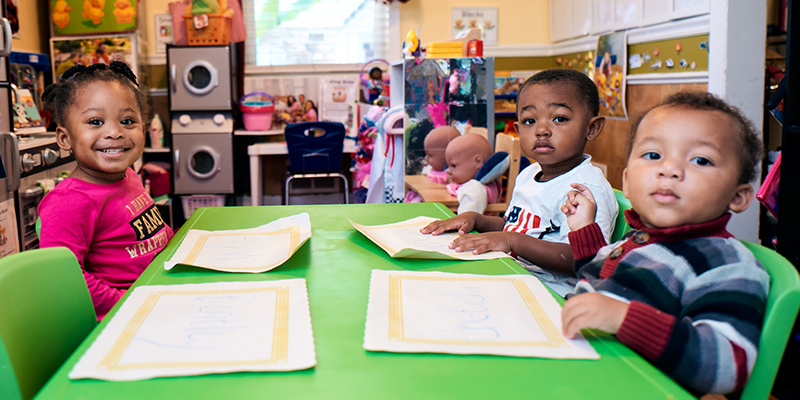The District of Columbia is on a path to become the national leader in supporting infants, toddlers, and the families of very young children.
By making high-quality early childhood education opportunities available and affordable to all families, regardless of income, race, or zip code, as well as creating a comprehensive and connected set of health and education supports for these children, we can affirm that equity can and must begin at birth for all DC families. But bringing this comprehensive and connected system to life will require further investments in Fiscal Year 2021, and beyond.
Equity Can and Must Begin at Birth
We’re thankful for the actions the Mayor and DC Council have taken in recent years to strengthen supports for families with young children, especially the focus on maternal and infant health, the creation of the Thrive by Five Coordinating Council, funding increases in the child care subsidy program to improve quality and increase supply, enhancements to the facility fund, and repurposing the former Stevens School, among others. Supports for pregnant women, infants and toddlers, and their caregivers are critical to a child’s health, success in school, and opportunities in life.
Targeted Investments for Children Under Three
Recently we wrote in a letter to Mayor Bowser to encourage her to make DC’s youngest children — and those who care for them — a top priority in the District’s upcoming fiscal year 2021 budget. Strengthening early childhood systems are critical to the District’s future, and key to addressing DC’s racial inequities in education, health, and economic security in particular.
We are urging funding choices this budget cycle that demonstrate DC’s leadership and commitment to the wellbeing of our infants and toddlers, and those who care for them:
- $20 million to increase the quality of early childhood education through DC’s child care subsidy program
- $20 million to increase compensation for early childhood educators doing critical and highly skilled work to support a child’s development and to enable parents to continue working
- At least $1.5 million to expand the District’s successful Healthy Futures program
All Children Deserve A Strong Beginning and a Limitless Future
The data is clear that when we invest more in high-quality early childhood education, we reduce differences in school readiness between rich and poor families. This readiness gap has lifelong consequences and perpetuates income inequality throughout a child’s life, impacting their ability to earn a decent living as an adult through no fault of their own. By acting now, we can ensure that every child, regardless of their family’s income or zip code, receives the high-quality education they deserve so they can thrive academically and pursue the future they desire.
Improve Quality of Care with Higher Child Care Subsidy Reimbursement Rates
Providing high-quality child care for infants and toddlers is extremely expensive and too many early childhood education centers operate in the red, creating tradeoffs on the quality and continuity of care that children need to thrive. This contributes to a limited supply of high-quality care offerings and too many programs shuttering, leaving families scrambling. Communities with lower incomes are disproportionately affected by this supply squeeze and are the same communities where local care providers rely almost entirely on the District’s subsidy program. By reimbursing early childhood education programs for the full amount it costs to provide excellent care, DC can catalyze improvements to infant-toddler care settings and encourage the growth of local child care businesses.
A $20 million investment to raise reimbursement rates and enable subsidized early childhood education programs to improve their quality of care will better ensure all of DC’s littlest residents have every opportunity to succeed.
Attract and Retain Skilled Early Childhood Educators with Equitable Pay
Early childhood educators are paid very low wages which makes it hard to attract a workforce with deep knowledge and experience in early childhood development. This contributes to high turnover as workers often leave to seek more stable salaries, and results in a stressed workforce where educators are preoccupied by concerns such as paying for rent, transportation and groceries.
Research shows that increasing compensation reduces turnover, creates a more skilled workforce, and improves the quality of learning that a child receives. Raising wages is also necessary to fairly compensate teachers as DC implements new, more rigorous education and credential standards for early educators.
A $20 million enhancement to subsidy reimbursement rates will enable educators — who are almost exclusively women of color — to receive better pay, ameliorating our shortage of qualified early childhood educators, making DC a leader in early childhood education pay equity, and ensuring teacher compensation matches the value of the skilled work being performed.
Expanding Mental Health Support is Vital
Mental health counseling for infants and toddlers can ensure healthy attachment, self-regulation, and socioemotional experiences occur during a child’s most critical developmental years. Counselors with Healthy Futures meet the mental health needs of young children, families, and educators by embedding themselves in early childhood education classrooms and working to support educators in nurturing children’s healthy socioemotional development, responding to challenging behaviors a child may be demonstrating, and providing strategies to educators to communicate respectfully and effectively with a family about their child’s mental health and developmental needs. Healthy Futures professionals also act as mental health support systems for early childhood educators struggling to meet the demands of their high-stress, yet underpaid job.
Increasing funding by at least $1.5 million for Healthy Futures will allow this vital program to expand to up to 60 new child development campuses, improving the mental health and wellbeing of thousands of infants, toddlers, parents, guardians, and educators.
We Are Stronger Together
These FY 2021 funding priorities complement and strengthen ongoing public and private efforts to improve services for families with young children, including the 5-year federal Preschool Development Grant received by the District and the DC Pritzker Children’s Initiative. We look forward to working with the Mayor, the DC Council, and the public to create the world-class comprehensive and coordinated system of health, educational, and economic supports that DC families deserve. We are eager to see significant enhancements in Healthy Futures and the child care subsidy program, among other key health and education priorities for young children, being reflected in the forthcoming FY 2021 budget.


